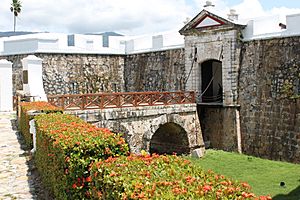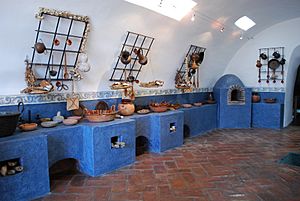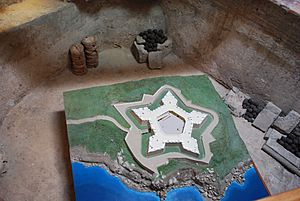Fort of San Diego facts for kids
Quick facts for kids Fort San Diego |
|
|---|---|
| Fuerte de San Diego | |
| Acapulco, Guerrero, Mexico | |

View of the Fort of San Diego
|
|
| Coordinates | 16°51′0″N 99°54′8.6″W / 16.85000°N 99.902389°W |
| Type | Star fort |
| Site information | |
| Controlled by | Instituto Nacional de Antropología e Historia |
| Open to the public |
Yes |
| Condition | Intact |
| Site history | |
| Built | 1616–1617 (first fort) 1778–1783 (second fort) |
| Built by | Spanish Empire |
| Materials | Stone |
| Battles/wars | Mexican War of Independence French intervention in Mexico Mexican Revolution |
| Garrison information | |
| Past commanders |
Pedro Antonio Vélez (1813) |
The Fort of San Diego (also known as Fuerte de San Diego in Spanish) is a cool, star-shaped fort in Acapulco, Mexico. It was built by the Spanish Empire a long time ago. This fort was super important for protecting the Pacific coast.
The first fort was built in the 1600s. Later, it was completely rebuilt in the 1700s. Today, it's a famous spot in Acapulco. You can visit it as the Acapulco Historic Museum (Museo Histórico de Acapulco).
Contents
Why Was the Fort Built?
The Spanish Empire built the Fort of San Diego to keep Acapulco safe. Acapulco was a very busy trading port. Ships called Manila galleons sailed from here. These ships carried valuable goods across the ocean.
Pirates often attacked these ships and the city. So, the fort was needed to protect everyone. The first fort was finished in 1617. A Dutch engineer named Adrián Boot designed it.
A New Fort Rises
In 1776, a big earthquake badly damaged the fort. It was so broken that they had to tear it down. A new fort was then built from 1778 to 1783. Ramón Panón designed this new, stronger fort.
The new fort was first called Fuerte de San Carlos. This was to honor King Carlos III of Spain. But most people still called it Fuerte de San Diego. So, the old name stuck around.
Battles and History
The fort was used in many important battles. During the Mexican War of Independence, Spanish soldiers held the fort. They fought against Mexican rebels for months. Finally, the fort was captured by Mexican forces in 1813.
The Fort of San Diego stayed an active military base for Mexico. It was also used during the French intervention in Mexico. Later, it played a role in the Mexican Revolution.
The Fort Becomes a Museum
In 1949, the fort was turned into a military museum. Later, in 1980, it was given to INAH. INAH is a group that protects Mexico's history.
The fort officially opened as a public museum in 1986. The museum teaches visitors about Acapulco's past. You can see old tools from the Mezcala culture. There are also items about the Manila galleons and pirates. You can learn about the Mexican War of Independence too.
The museum is open from Tuesday to Sunday. On Sundays, you can visit for free!
How the Fort Was Designed
The First Fort's Shape
The first fort, designed by Adrián Boot, had an unusual five-sided shape. It had five special towers called bastions. These bastions had cool names like:
- Baluarte del Rey (King's Bastion)
- Baluarte del Príncipe (Prince's Bastion)
- Baluarte del Duque (Duke's Bastion)
- Baluarte del Marqués (Marquis' Bastion)
- Baluarte de Guadalcázar (Guadalcázar Bastion)
The Second Fort's Shape
The fort you see today was designed by Ramón Panón. It has a perfect five-sided star shape. Its five bastions are named after saints:
- Baluarte de San José (St. Joseph Bastion)
- Baluarte de San Antonio (St. Anthony Bastion)
- Baluarte de San Luis (St. Louis Bastion)
- Baluarte de Santa Bárbara (St. Barbara Bastion)
- Baluarte de la Concepción (Conception Bastion)
Each bastion used to have a small lookout tower. These towers were removed in the 1970s.
See also
 In Spanish: Fuerte de San Diego para niños
In Spanish: Fuerte de San Diego para niños
- Military of New Spain
 | Tommie Smith |
 | Simone Manuel |
 | Shani Davis |
 | Simone Biles |
 | Alice Coachman |




